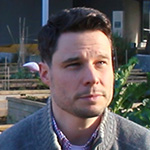Listen in to insights from a conversation with Will Valley, Instructor in the Faculty of Land and Food Systems, and Colin Dring, Executive Director of Richmond Food Security Society, who share their learnings about the process of building a relationship between faculty and community organizations. Partnerships like this, supported by UBC’s Centre for Community Engaged Learning, provide a context for theoretical classroom learning and provide important learning experiences for future professionals.
Students from Land and Food Systems involved in community-based experiential learning.

Executive Director – Richmond Food Security Society

Instructor – Faculty of Land and Food Systems, UBC
Key insights
- It’s important to take time to be sure to be aware of the context, timing and working environment of both university and community partners in order to optimize relationships.
- It’s important to maintain flexibility in communicating outcomes and structures for partnership. Keeping communication open helps maintain the relationship for the long-term.
- Involving students in community settings is one way to enhance student comprehension of theory.
Comments are closed, but trackbacks and pingbacks are open.